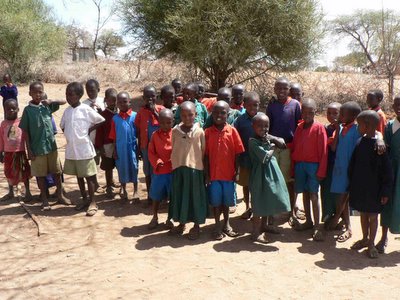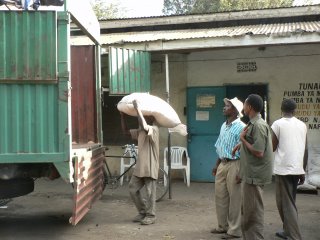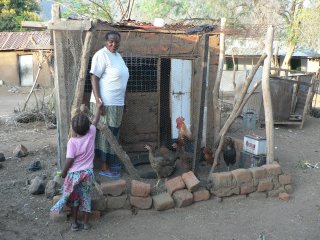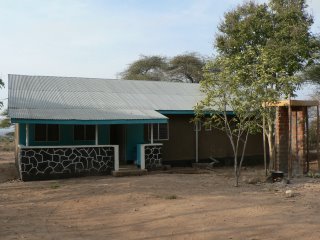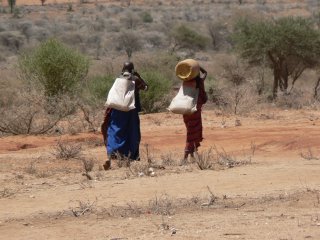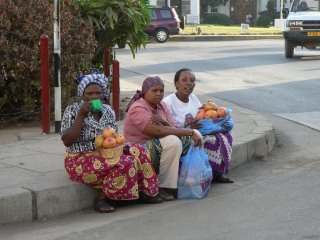
Today, Sunday, is my last day in Arusha for awhile. Steven just called to say he is in town visiting a prisoner and wants to get together around 1:30 p.m. There is nothing that man doesn’t do. When I saw him a two days ago he mentioned how really excited everyone is about the new library. I can hardly wait to go on a shopping spree with him to purchase books.
There is another good news story in this week’s Arusha Times about the opening of the Free Library in the village of Imbaseni, near the Arumeru district.
In addition to having books in both English and Kiswahili on a wide range of subjects available to students, teachers and the local people, the library also offers programs. Each Monday there is a children’s program. The morning program is for pre-school age children and the afternoon is for students in primary school. In each session, a book is read aloud and an activity is offered to the children that is related to the story they have just heard. On Saturdays, primary school students are taking part in a “book writing” program where they are writing their own books, creating their own illustrations and eventually binding their books. The library will have a copy of each book on the shelves for others to enjoy.
Definitely some ideas Longido will be interested in hearing about.
My small room on the third level (second floor) here at the Lutheran Center has been my home for the past 7 days. I have gotten into a nice rhythm. I rise about 7:00 a.m., get dressed, make a cup of coffee then get to work on my lap top. About 9:00 a.m. I go downstairs to the Bamboo Café usually for coffee with steamed milk and a chapatti. Often someone joins me. Then it is back up stairs by 10:00 a.m. to finish writing and checking through photos for the journal entry. Next, I check out internet cafés for availability. Yesterday I tried out four before eventually uploading my entry. The most reliable one for me is the CyberNet on India Road, a stones throw from here.
Everything takes time. It is impossible to go directly from “A” to “B” in Tanzania. Everyone says
hujambo mama or
shikamoo, stops to talk, or wants to sell you something – newspapers, shoes, jewelry, batiks, fruit, candy, or countless other useful or not-so-useful things. Today I purchased some small bread baskets from an older woman on my way home. They match some Marian and I picked up last year. They still smell deliciously of the fresh grass they were made from.
Next, I sometimes check in on old friends, exchange money, do laundry, or read. About 1:30 or 2:00 p.m. I go to the Sidewalk Café where the girls usually make me a small sandwich – I like the chicken tika - which I have with water. Then it is time for a siesta until about 3:30 or 4:00 p.m. when I make a cup of chamomile tea and return to my lap top to continue writing about events I am seeing and experiencing here in the city. Around 6:00 p.m. I walk over to the luxurious Arusha Hotel – where some of the lawyers from the Rwanda War Crimes Tribunal stay - about a two minute walk away, to read from
Finding Our Way, Meg Wheatley's book, while I sip on a cold Kilimanjaro lager. The setting is relaxing. Comfy chairs, quiet enough, and nice gardens all around. At 7:00ish I order supper from their snack menu. It is inexpensive and just enough. One night I had an ‘Arusha Burger’ with fries; on another, a ham and cheese and pineapple sandwich and fries; last night, pasta with some kind of hot sauce on it. I still steer away from unpeeled fruits, vegetables, salads, juices and ice cubes - something we were advised to do during our first visit in 1998. It may not be necessary in fine establishments like the Arusha Hotel, but I don’t want to take chances. If it is not cooked, I don’t eat it. The last thing I want is to be sick here. I drink water…lots of water. About 8:00 or 8:30 p.m. it is dark and I walk directly back to my room. Security guards are visible on Boma Rd. but still no stopping or chatting. A little more writing or reading then my light is out by 10:00 p.m.
When I arrive in Longido tomorrow morning, my schedule and activities will be very different, so it has been important to ease my way into life here. Tonight I will re-pack and organize a bit, though I did a lot of that when I unpacked last Tuesday. Instead of having two really heavy bags and a solar oven to transport, I have a four manageable bags. In the morning when Mary arrives from MWEDO, I will pick up my fruit from the ladies at the corner and stop to buy a case of drinking water, then I am off for the next stage in my visit. I hope to have a moment to upload this entry.
I have just returned from having lunch with Steven and another man from Longido. We were joined by the Tanzania coordinator of another local NGO doing AIDS education with girls, I think in a mining area. He has heard of the work TEMBO is doing from MWEDO and knows it is not about the animal ‘tembo’ (Swahili for elephant.) I said, yes, this is true but that we do hope to slowly grow to be as big as a tembo.
We briefly touched on many things:
1. Steven reported the sad news that our friend Baraka’s cousin just died very suddenly – a young boy just beginning Form 1 (grade 9) – food poisoning, they think.
2. In doing research for his letter to request food assistance for his people, Steven says about 25 cows are dying every day due to the drought. One man had lost 350 head of cattle, another 300, others 50 and so on. It would be like going bankrupt, only there are no other saved resources to fall back on.
3. There are two options for the new library: one is a building adjacent to Longido Primary School another is a room at the World Vision ADP (Area Development Project) area, since World Vision is gradually pulling up stakes and will be gone by September. I suggested the location at the ADP might be more appropriate since one of the goals is to encourage adults to use the facility. Steven agreed.
4. Steven is not teaching in Nairobi this year because he is so involved with LOOCIP (Longido Community Association) the organization replacing World Vision. He is disappointed that World Vision is not more involved with the transition process and the training of leaders who will now be responsible for the running of community programs. It seems there was no provision for this stage in their budget.
5. Steven says there is a kerosene stove at the ADP guest house for me to use to boil water to wash with. He wants me to set up the solar oven outside the ADP guest house where I am staying, and was thrilled to hear that the oven will also take care of water pasteurization. If we can get this working well while I am here, Steven will ask a group of friends from the U.S., coming for a visit at the end of June, to each bring an oven along with them. I have a recipe for ugali and a sweet cornbread cake I will try, as well as other recipes for meat and vegetables.
As I write this, there is the sound of thunder outside accompanied by the sweet smell of rain. Just a bit, but it is RAIN! What a welcome aroma. I am off to Longido in the morning and I hope some rain will come along with me. I took this photo on the grounds of the Arusha Hotel today after the rain, one of the places in town where the surroundings are quite lush.























